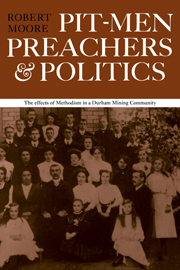Book contents
- Frontmatter
- Contents
- Dedication
- Acknowledgements
- List of abbreviations
- Introduction
- 1 Historical background
- 2 The Deerness Valley
- 3 The social and economic basis of paternalism: the colliery-owners in the Deerness Valley
- 4 Village Methodism – I
- 5 Village Methodism – II: the structure of the Methodist societies in the Deerness Valley
- 6 The respectable Methodists and the old Liberalism
- 7 The radicals and the Labour Movement, 1900–1926
- 8 Methodists in action: three political case studies
- 9 1970 – a postscript
- Conclusions
- Appendix I research strategy and techniques
- Appendix II the Methodist community and objections to Anglican union
- Appendix III the religious statistics
- Appendix IV occupational status, social mobility and the structure of Methodist leadership
- Notes
- Bibliography
- Glossary
- Index
- Frontmatter
- Contents
- Dedication
- Acknowledgements
- List of abbreviations
- Introduction
- 1 Historical background
- 2 The Deerness Valley
- 3 The social and economic basis of paternalism: the colliery-owners in the Deerness Valley
- 4 Village Methodism – I
- 5 Village Methodism – II: the structure of the Methodist societies in the Deerness Valley
- 6 The respectable Methodists and the old Liberalism
- 7 The radicals and the Labour Movement, 1900–1926
- 8 Methodists in action: three political case studies
- 9 1970 – a postscript
- Conclusions
- Appendix I research strategy and techniques
- Appendix II the Methodist community and objections to Anglican union
- Appendix III the religious statistics
- Appendix IV occupational status, social mobility and the structure of Methodist leadership
- Notes
- Bibliography
- Glossary
- Index
Summary
Sociologists seem to have neglected the persistent presence of Methodism, whereas historians have argued about it for as long as historians have attempted to give an account of the development of the social and political institutions of modern Britain. Lecky and Buckle, for example, were among the first who tried to take stock of the radical transformation of British society and construct an account of what had actually happened. What kind of society had been created, and by what processes? Both accepted the common nineteenth-century belief that modern society was marked by the advance of reason and the decline of religion, that the ancient superstition was being replaced by science and the culture of democracy, and would continue to be so replaced.
Buckle argued that the progress of mankind depended on the development of the spirit of free enquiry and the dissemination of knowledge. ‘Intellectual’ truth had to take precedence over ‘moral’ truth. The main hindrance to these processes was the protective attitude of church and state which did not allow men to think for themselves and develop intellectually.
Lecky in his Rationalism in Europe selected beliefs in witchcraft, miracles and future punishment as particular examples of the whole range of religious beliefs that had been a brake upon the development of civilisation. The power of such beliefs had been very great, but it was being overcome by the rational spirit of modern, scientific man.
- Type
- Chapter
- Information
- Pitmen Preachers and Politics , pp. 1 - 27Publisher: Cambridge University PressPrint publication year: 1974



